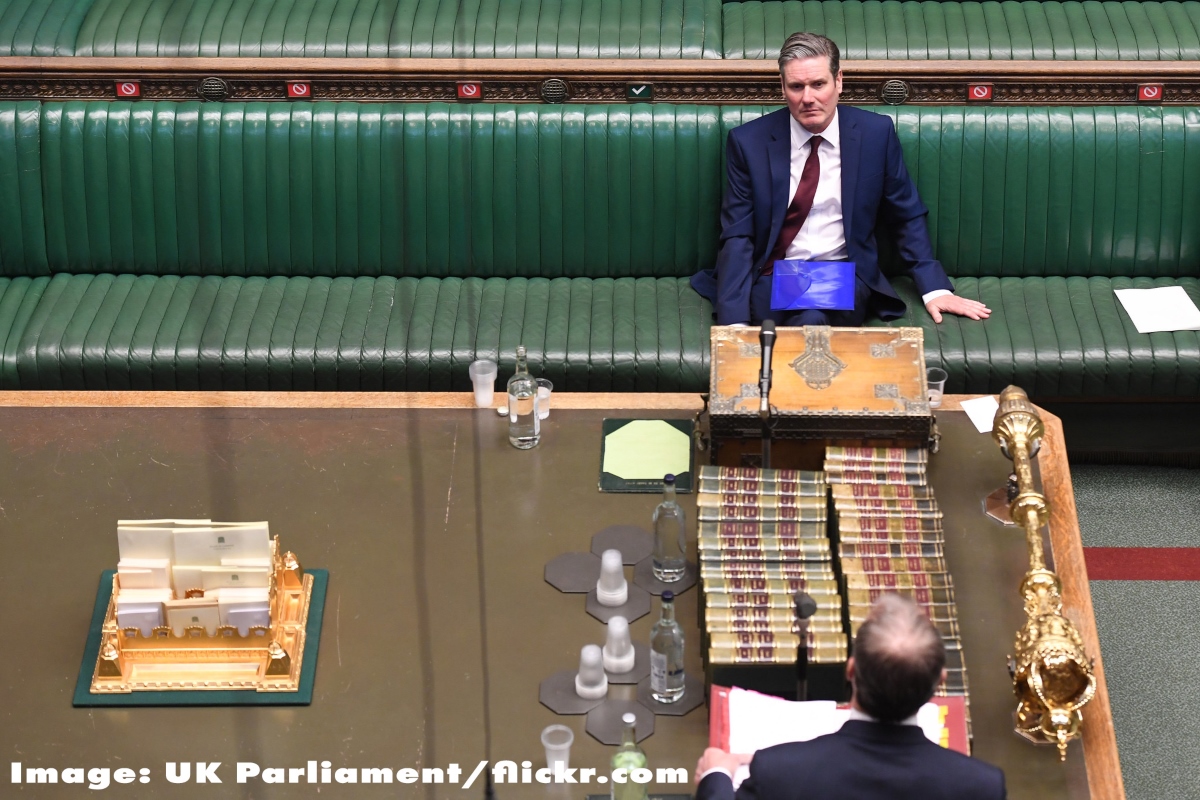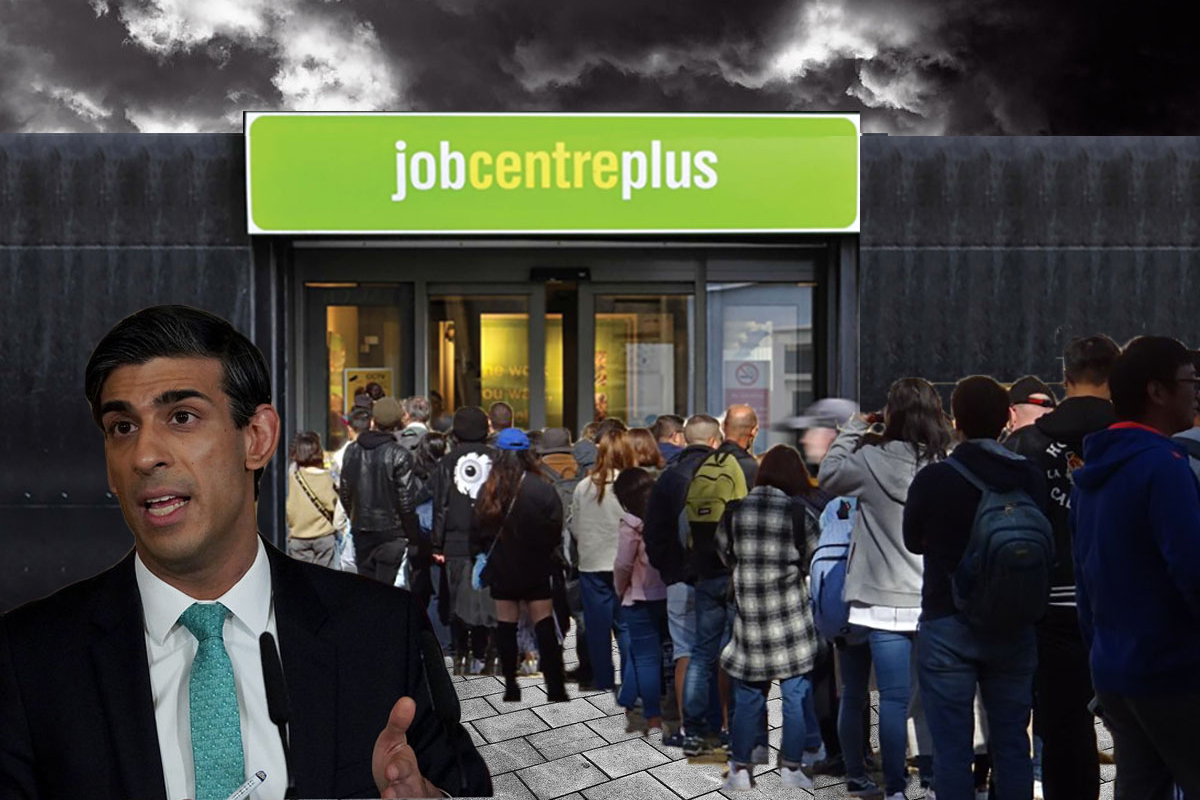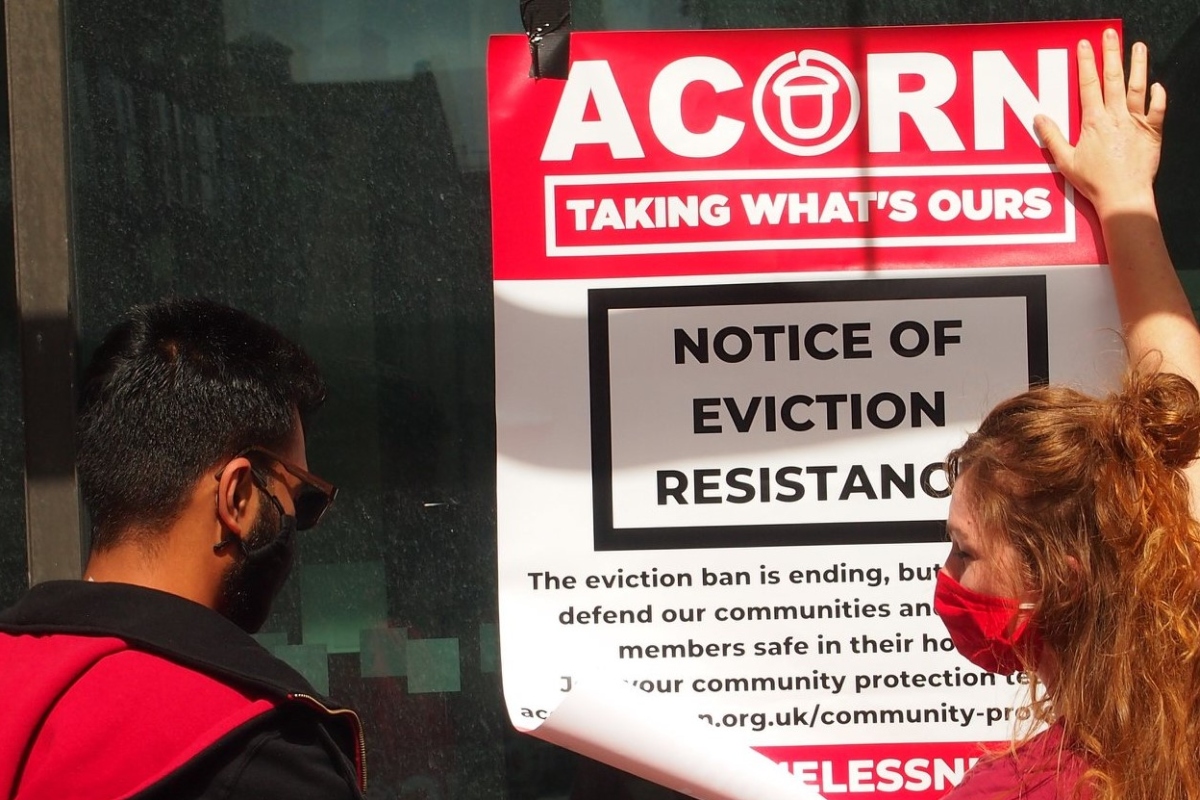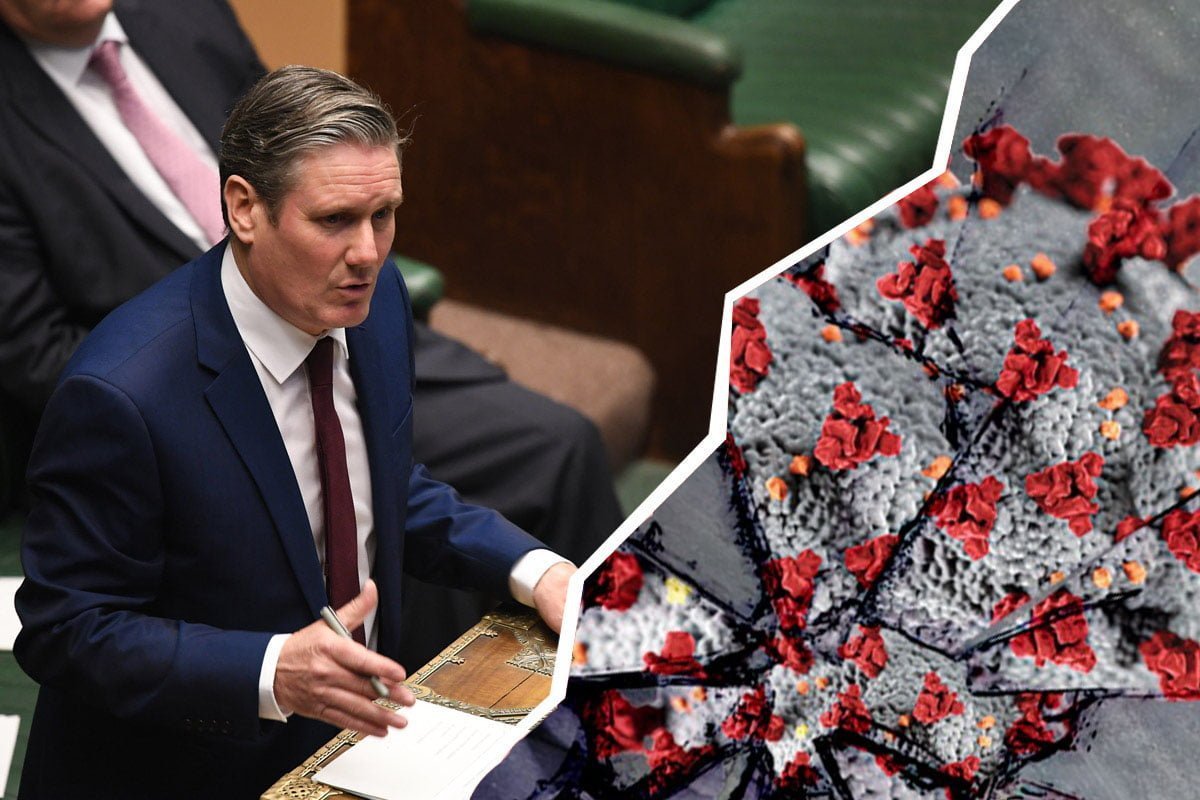With Boris Johnson dragging his feet over the escalating epidemic, Keir Starmer has come out in support of a new temporary national lockdown. How can the labour movement ensure that workers do not foot the bill for this crisis?
The country is in the grip of a second wave. The disease is spreading. COVID case numbers are soaring. Hospital admissions are rising.
Yet faced with this escalating public health crisis, Boris Johnson is caught like a rabbit in the headlights.
Lives vs profits
On the one side, rebellious Tory backbenchers – reflecting the interests of big business – are noisily opposing the limited measures that the Prime Minister is willing to endorse.
At the same time, Johnson and his Cabinet are at loggerheads with regional politicians, who are enraged about being shouldered with the responsibility for a crisis made in Downing Street.
They are “passing the buck and passing the bill”, exclaimed Andy Burnham, mayor for Greater Manchester, criticising the government’s proposal for tighter local restrictions, but without the necessary accompanying financial support for those put out of work as a result.
On the other side, the Tory leader is also out of favour with the scientific experts, whose advice he had shunned in favour of the demands of the bosses.
It was recently revealed that, back on 21 September, SAGE – the government’s official scientific advisory group for emergencies – had recommended that a national ‘circuit breaker’ be introduced.
This would involve a fortnight-long lockdown across the whole country, with the aim of curbing the infection rate and bringing cases down to a level whereby they could be effectively tracked and controlled.
At the time, SAGE warned that the country was facing a “very large epidemic with catastrophic consequences” unless immediate action was taken. The advisory council also stated that a second wave “would fall disproportionately on the frailest in our society, but also those on lower incomes and BAME [black, Asian and minority ethnic] communities”.
But this recommendation was callously spurned by Johnson. Concerned by the potential hit to the bosses’ profits, the PM instead chose only to bring in the ‘rule of six’ and a 10pm curfew for pubs and restaurants.
University students, meanwhile, were encouraged by money-hungry administrators to travel across the country for the start of the new term, creating an ideal breeding ground for contagion.
Test and trace failure
 Topping off this fiasco has been the government’s abysmal test and trace system.
Topping off this fiasco has been the government’s abysmal test and trace system.
Boris Johnson initially promised that Britain’s system would be “world beating”. But after being delayed by months, its eventual launch has been an unmitigated disaster.
In early September, as was entirely predictable, the number of people with symptoms started to increase. The system soon collapsed.
At one point, only one-third of people could get their test results within 24 hours. Many people in need of a test were being sent miles away to the nearest available testing centre. And the proportion of close contacts tracked for each positive case has been consistently below 80% – the level that doctors believe is required.
As with so many other parts of the government’s response to COVID-19, test and trace was also tendered out to private profiteers: in this case, the infamous Serco, which has been awarded contracts worth over £400 million.
Speaking in Parliament, Liverpool Walton MP Dan Carden rightly denounced the cronyism involved in the awarding of these contracts:
“Conservative baroness and business executive Dido Harding was appointed as the head of test and trace; Serco’s CEO is the brother of a former Tory MP; and Tory MPs sit on the boards of companies winning contracts.
“And if you’ve got a problem with any of this, well why not take it up with the government’s anti-corruption champion: Dido Harding’s husband, a Tory MP. The whole thing stinks.”
The whole thing stinks.
This Government’s incompetence, its cronyism, its ideological obsession with outsourcing and rip-off privatisation has undermined our NHS and put lives at risk.
Time to kick the profiteers out of the system and put local public health teams in charge. pic.twitter.com/ivqRy4WgOe
— Dan Carden MP (@DanCardenMP) October 14, 2020
It has now emerged that in order to try to resolve the whole shambolic operation, the government has brought in private consultants from the Boston Consulting Group who are being paid up to £7,000 a day!
And so we arrive at the current situation…
Opportunism
 Such is the scale of the current chaos, that Keir Starmer has finally been forced to leap into action, after months of passivity. Opportunistically, he has said that he ‘sides with science’ and has asserted his support for SAGE’s circuit breaker strategy, challenging the government’s line.
Such is the scale of the current chaos, that Keir Starmer has finally been forced to leap into action, after months of passivity. Opportunistically, he has said that he ‘sides with science’ and has asserted his support for SAGE’s circuit breaker strategy, challenging the government’s line.
Adulating liberal commentators in the mainstream media have lavished praise on the Labour leader for his new stance, commending him for ‘playing a blinder’.
In reality, however, Keir Starmer is shooting at an open goal. According to one survey by YouGov, 68% of the public support the idea of a two-week nation-wide lockdown, coinciding with the start of the school half-term.
‘Sir’ Starmer, meanwhile, has the support of key sections of the establishment, who have decidedly turned on Johnson for his bumbling ineptitude.
68% of Britons say they would support a two-week nation-wide “circuit breaker” lockdown at the start of the school half term later this month https://t.co/YEVN7i735f pic.twitter.com/l8JFT22eUS
— YouGov (@YouGov) October 14, 2020
The need for urgent and bold action is clear. But the real question is: why hasn’t Starmer taken a shot at the government sooner? Why has he backed all of the government’s main proposals up until now, restricting his role to that of mere “constructive opposition” (that is to say, no opposition at all)?
The reason is that Starmer is not a leader, but a follower – a follower of the diktats of the ruling class, whose approval and acceptance he cravenly desires. All he really wants is a chance to shine as the ‘respectable statesman’; to be a loyal, flag-waving knight of the realm to ‘his’ Queen and Country.
Workers’ fears
 Importantly, Starmer’s criticism of the Tory government doesn’t go far enough. For example, he has not addressed crucial issues like the outsourcing of the test and trace system to profiteers. Nor has he advocated measures necessary to prevent job losses and protect workers.
Importantly, Starmer’s criticism of the Tory government doesn’t go far enough. For example, he has not addressed crucial issues like the outsourcing of the test and trace system to profiteers. Nor has he advocated measures necessary to prevent job losses and protect workers.
Concerned by the government’s ballooning deficit and debts, the ruling class have now clearly signalled their intention to turn off the taps of state support, leaving workers in the lurch.
Many workers, therefore, are rightly fearful that it is they who will pick up the tab for the mess created by Tories. One recent study, for example, estimates that two million jobs are on the line in potentially affected industries and areas.
Rishi Sunak and Boris Johnson, unsurprisingly, have shown callous disregard for such workers. Shrugging their shoulders, their message has effectively been that of ‘get on your bike’ and find a new job.
Whilst enjoying the media limelight, the Labour leader has done little to assuage the fears of these workers, who will be left high and dry in the event of a new lockdown.
For example, the Chancellor’s latest wage subsidy package only promises workers two-thirds of their usual pay. The government’s more ‘generous’ Job Support Scheme, meanwhile, provides a top-up to 77% of ‘normal’ income levels – but only if your boss is benevolent enough to employ you for at least one-third of your usual hours.
How can minimum wage workers in the hard-hit hospitality sector, for example, be expected to scrape by on such amounts when they still have to pay their rent and bills in full? No wonder there is skepticism and trepidation towards the idea of another lockdown amongst a layer of the working class.
Act now
 So what should Labour be demanding to ensure that workers do not suffer the economic consequences of a circuit breaker? How can we tackle the pandemic in a way that puts the interests of the working class first? And what is the socialist alternative to the current COVID chaos, caused by the Tories’ defence of profits over lives and livelihoods?
So what should Labour be demanding to ensure that workers do not suffer the economic consequences of a circuit breaker? How can we tackle the pandemic in a way that puts the interests of the working class first? And what is the socialist alternative to the current COVID chaos, caused by the Tories’ defence of profits over lives and livelihoods?
At the very least, Labour should be calling for the following:
1) A proper test-and-trace system. This is essential – a circuit breaker makes no sense unless it is used to put in place the structures needed to prevent further outbreaks from getting out of control.
To be effective, such a system must be properly funded and staffed, and fully under public control. This means booting out parasitic outsourcing companies like SERCO, and giving power to healthcare workers, councils, and local communities in order to maximise participation.
2) Safe work or full pay. Any lockdown must be accompanied by measures to provide for workers affected by closures. This means providing 100% wage support to anyone who needs to be furloughed, as well as full sick pay to those required to isolate.
Workers cannot be expected to live on two-thirds of their usual income when they have to pay their rent and bills in full.
Rather than praising the class-collaborationist policy that is the Tories’ Job Support Scheme, the labour movement leaders should be mobilising workers to defend jobs, safe working conditions, and full pay.
3) Remote learning and free education. Universities should move all teaching online until the conditions demanded by the UCU (representing lecturers and other higher education workers) are met. This includes the provision of mass testing for students and staff.
Alongside this, tuition fees and student rents should be scrapped – replaced with free education and maintenance grants for all.
And student unions should democratically organise students in every hall of residence, in order to plan and arrange food deliveries for those forced to isolate, and to work with universities to implement the necessary health and safety measures.
4)Put teachers in control of school reopenings: Schools should only return after the circuit breaker on the basis of meeting the conditions demanded by the NEU teachers’ union.
These demands include: the creation of ‘Nightingale’ schools, with additional buildings and teachers, in order to create space and ensure social distancing; free laptops and wifi for all pupils, to provide universal access to online learning; and, again, a robust test-and-trace system.
5) Ban evictions and cancel housing debts. Nobody should face the threat of homelessness during this crisis – or ever. Any rent debts or mortgage arrears should be cancelled. And local authorities should be given powers to cap rents at affordable levels.
For those already on the streets, rooms at major hotel and hostel chains should be requisition in order to provide decent temporary accommodation. And, in the long run, empty properties and the assets of the big landlords and management companies should be brought under public control.
This should be done alongside a mass programme of social housing construction, based on the nationalisation of the banks, land, and construction monopolies, under workers’ control.
Although not in central government, in many areas Labour are in power: in Wales; in important mayoral positions in London, Manchester, Liverpool, and elsewhere; and in local councils across the country.
Labour must utilise every lever at its disposal to launch a mass campaign for the above programme. This means supporting workers in struggle, and joining forces with the trade unions – in local government, in the NHS, in education – in order to give the organised working class confidence and control.
No more Tory foot-dragging! The labour movement must act now to save lives and protect working-class communities from the double dangers of the virus and of unemployment.
Make the bosses pay!
 Of course, if all these necessary measures are taken, the key question is: who pays?
Of course, if all these necessary measures are taken, the key question is: who pays?
The Tories have made it very clear in all their speeches what their answer is. Their mantra is to ‘balance the books’ – that is, to shift the state’s vast debts onto the shoulders of the working class, through further austerity and tax rises.
We say: Make the bosses pay for this crisis!
The biggest capitalists have mountains of accumulated profits, all appropriated from the exploitation of the working class.
According to the High Pay Centre think tank, from 2014-2019, the top 100 companies on the FTSE stock exchange had a combined profit of £42 billion. In addition, they handed over £26 billion in dividends to shareholders.
These figures equal the total projected cost of the furlough scheme, which in many cases is paid to these same giant companies. It is out of this – not through an ever-expanding national debt (i.e. future austerity) – that the above measures should be funded.
Neither workers nor struggling small business owners should pay a penny to fight the pandemic. It is big business – the banks and giant corporations – who must pay. This means expropriating the wealth of the super-rich and nationalising the key financial companies and industries.
This is the only way to tackle the coronavirus crisis whilst protecting both the lives and livelihoods of the working class, the youth, the oppressed, the poor, and the vulnerable.
Under capitalism, the ‘choice’ facing ordinary people will continue to be one of death by disease or death by poverty. Workers and youth must organise and mobilise to ensure that the outcome for humanity is socialism, not barbarism.






